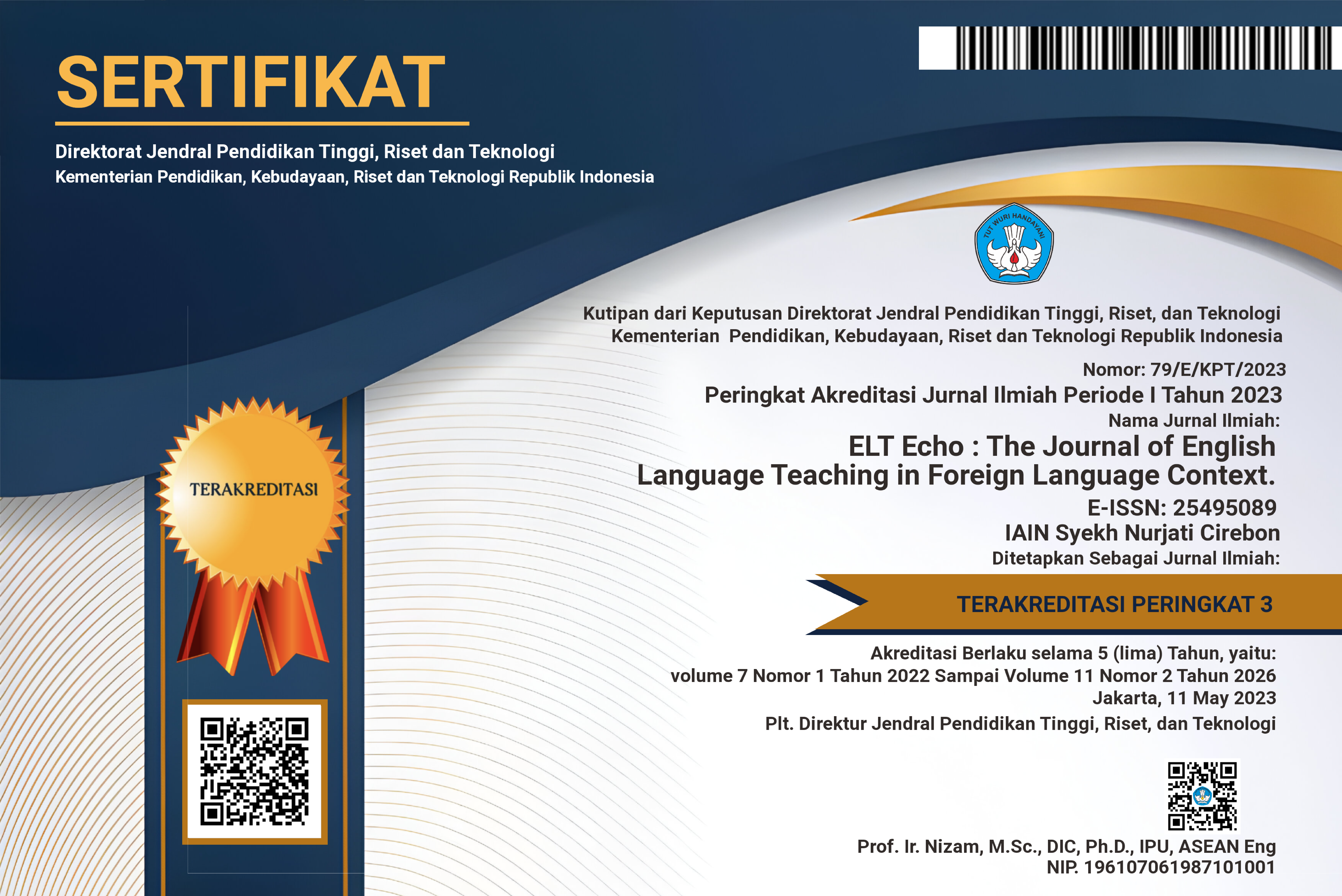UTILIZING REAP STRATEGY (READ-ENCODE-ANNOTATE-PONDER) TO ENHANCE LEARNERS' READING COMPREHENSION ACROSS VARIED READING HABITS
(1) Universitas Islam Ogan Komering Ilir Kayuagung
(2) Universitas Islam Ogan Komering Ilir Kayuagung
(3) Universitas Islam Ogan Komering Ilir Kayuagung
(4) Universitas Islam Ogan Komering Ilir Kayuagung
(5) Universitas Islam Ogan Komering Ilir Kayuagung
(6) Universitas Islam Ogan Komering Ilir Kayuagung
(7) Universitas Islam Ogan Komering Ilir Kayuagung
(*) Corresponding Author
Abstract
Keywords
Full Text:
PDFReferences
Afflerbach, P. (2018). Understanding and using reading strategies to develop reading comprehension. Educational Psychology Review, 30(2), 423-445.
Amalia, F., Inderawati, R., & Erlina, E. (2018). Reading comprehension achievement on narrative text by using REAP strategy. CHANNING: Journal of English Language Education and Literature, 3(1), 1-7.
Asmara, R., & Sartika, D. (2020). Word splash strategy in reading comprehension class. LINGUA: Jurnal Bahasa dan Sastra, 20(2), 145-151.
Dewi, I. A. G. P. R., Marhaeni, A. A. I. N., & Paramartha, A. G. Y. (2019). The effect of REAP strategy on reading comprehension of the eighth-grade students. International Journal of Language and Literature, 3(3), 112-120.
Eanet, M. G., & Manzo, A. V. (1976). REAP-A strategy for improving reading/writing/study skills. Journal of Reading, 19(8), 647-652. http://www.jstor.org/stable/40032892
Elmansi, H. M. (2023). Using read, encode, annotate, and ponder (REAP) strategy to enhance EFL reading comprehension skills and critical thinking disposition of first-grade secondary school students. CDELT Occasional Papers in the Development of English Education.
Freahat, N & Smadi, M. (2014). Lower-order and higher-order reading questions in secondary and university-level EFL textbooks in Jordan. Theory and Practice in Language Studies, 4(9), 1804-1813. doi:10.4304/tpls.4.9.1804-1813
Indriani, I. (2019). Correlation between reading habit and reading comprehension achievement of English department students of IAIN Palangka Raya (Doctoral dissertation, IAIN Palangka Raya).
Jatmiko, A., Kurniawan, K., & Putri, M. (2016). The effect of REAP strategy toward students’ reading comprehension in narrative text of the second year at SMAN 14 Pekanbaru. Discover, 2(12), 12-19.
Khanam, M., Zahid, M. S. H., & Mondol, M. S. (2014). The role of schema for effective EFL reading comprehension. ASA University Review, 8(1).
Khalisa, N. (2018). The correlation between students’ reading habit and their writing ability (Doctoral dissertation, UIN Ar-Raniry Banda Aceh).
Manzo, A., Manzo, U., & Albee, J. J. (2002). iREAP: Improving reading, writing, and thinking in the wired classroom. Journal of Adolescent & Adult Literacy, 46(1), 42–47. http://www.jstor.org/stable/40017504
Owusu-Acheaw, M. (2014). Reading habits among students and its effect on academic performance: A study of students of Koforidua Polytechnic. Library Philosophy and practice (e-journal). University of Nebraska, Lincoln.
Palani, K. K. (2012). Promoting reading habits and creating literate social. International Reference Research Journal, 27 (3), 1-12.
Pressley, M., & Afflerbach, P. (2015). Verbal protocols of reading: The nature of constructively responsive reading. Routledge
Qrqez, M., & Ab Rashid, R. (2017). Reading comprehension difficulties among EFL learners: The case of first and second year students at Yarmouk University in Jordan. Arab World English Journal (AWEJ), 8(3), 421-431. doi: http://dx.doi.org/10.2139/ssrn.3053577
Supriyantini, S. (2017). Using read encode annotate and ponder (REAP) technique to increase reading comprehension: A case of the eleventh-grade students of SMA Negeri 6 Semarang. ETERNAL (English Teaching Journal), 8(2). doi: https://doi.org/10.26877/eternal.v8i2.3052
Wijayanti, E., Mujiyanto, Y., & Pratama, H. (2022). The influence of the teachers' reading habit on their teaching practice: A narrative inquiry. English Education Journal, 12(2), 205-214. doi: https://doi.org/10.15294/eej.v12i2.56256
Wiyasa, P. A. (2015). Improving students’ English reading skills by using peer-assisted learning strategies of grade VII students of SMP 1 Jogonalan Klaten in the academic year of 2013/2014 (Doctoral dissertation, Thesis. Yogyakarta: UNY.
Wulandari, D. N., Ihsan, D., & Hayati, R. (2014). Teaching reading comprehension to the eighth graders of SMPN Negeri 53 Palembang through reading, encoding, annotating, pondering (REAP) strategy. The Journal of English Literacy Education: The Teaching and Learning of English as a Foreign Language, 1(1), 88-100.
Wulandari, T. R., Kurniaman, O., & Permana, D. (2023). Hubungan kebiasaan membaca dengan kemampuan membaca pemahaman siswa sekolah dasar. TSAQOFAH, 3(6), 1271-1282.doi:10.58578/tsaqofah.v3i6.1858
Zasrianita, F. (2017). Using reading, encoding, annotating, and pondering (REAP) technique to improve students' reading comprehension (A classroom action research at eighth-grade students in MTsN 1 Kota Bengkulu in academic years 2016). Ta'dib, 19(2), 147-164.
DOI: 10.24235/eltecho.v9i2.18585
Article Metrics
Abstract view : 22 timesPDF - 9 times
Refbacks
- There are currently no refbacks.
Â
This Journal is indexed by:
Â

This work is licensed under a Creative Commons Attribution 4.0 International License.










